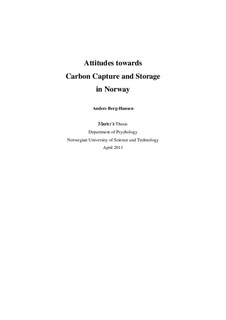Attitudes towards Carbon and Storage in Norway
Master thesis
Permanent lenke
http://hdl.handle.net/11250/270753Utgivelsesdato
2011Metadata
Vis full innførselSamlinger
- Institutt for psykologi [3108]
Sammendrag
This study presents the results of a 2010 Internet survey conducted on 999 Norwegian citizens aiming to investigate and explain the main determinants of public attitudes towards carbon dioxide capture and storage (CCS), a technology considered crucial for mitigating adverse consequences of global climate change. The results confirmed the main hypothesis, in line with previous research based on risk psychology and the risk-benefit model: Attitudes towards CCS were positively related to benefit perceptions and negatively related to risk perceptions, but this study found benefit perception to be a stronger predictor of attitudes than risk perception. Clear relationships were also found between attitudes towards CCS and other predictor variables. Perception of CCS as an interference with nature was negatively related to attitudes, while general trust in science and technology, a concept labeled epistemic trust, was positively related to attitudes towards CCS. Based on the results, epistemic trust seemingly was a more important predictor than social trust. Climate change concern did not directly predict CCS attitudes, but mediation analysis revealed an indirect relationship through benefit perception. Ecological concern, as measured by The New Ecological Paradigm Scale, was not a significant predictor of attitudes towards CCS and neither were knowledge of environmental issues, climate change or the CCS technology. Knowledge was, however, negatively related to risk perception. The results and future implications are discussed.
